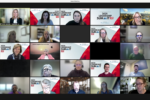Revitalizing the Economic Development Committee
During the past two+ years the Springfield Chamber has invested significant resources on workforce strategies, leadership training and business education. During that time, given an already full plate, the Chamber rested its Economic Development Committee until the time came to broaden that work.
At the start of 2019 the Economic Development Committee reconvened in a new format with new purpose. The Committee is now separated into two groups:
- The Economic Development Committee is open to any Chamber member and meets periodically to consider major topics of economic development for the community and the region.
- The committee also include a smaller group known as the Chamber Economic Development Council. The Council serves in an advisory capacity for the Committee, identifying critical issues to explore and whether the Chamber should consider investing resources toward them.
In addition to these important and strategic functions the Economic Development Committee will assume primary responsibility for the Chamber’s “Business Resource Hub” efforts. These efforts include informing and guiding the development of the new annual mid-year State of Business Breakfast and developing a dashboard to track Business Resource Hub metrics to be identified.
The outcomes of the Council’s early work include the following lists. The first identifies the Chamber’s Economic Development Priorities, areas of potential action on behalf of the local business community. The second, Measures of Success, is a collection of quantitative and qualitative metrics the Committee can use to monitor economic improvement.
Economic Development Priority Position Statements
Talent & Workforce Development
Education and skills are the keys to both individual prosperity and economic vitality in Springfield. The Chamber supports initiatives that help prepare the 21st century workforce and ensure a pipeline of future talent for the businesses driving the economy forward.
Amenities
The lived experience is a key attractor for a community’s workforce. Recreation, education, nature, shopping, dining, novel experiences and more, all work together to make a place desirable. The Chamber supports efforts to build upon existing assets and encourages the development of new experiences that contribute to our sense of place.
Regulatory Climate
Sustained economic prosperity depends on a vibrant business climate. The Chamber is working to ensure a favorable environment in which regulations are not overly burdensome, where resources and policies support and sustain small business, and where changes to the tax landscape are well reasoned and productive for the business community.
Land Use
Efficient governmental processes, meaningful incentives and reasonable application of state and local land use laws are critical to commercial development and commerce. The Chamber supports efficient and effective development review and efforts to ensure an adequate supply of commercial and industrial land.
Transit
A robust and efficient transportation network is vital to ensuring livable communities, productivity, commerce and a clean environment. The Chamber supports sustainable infrastructure investment, productive and cost effective public transportation options and next generation transportation initiatives.
Infrastructure
The Chamber works to ensure our infrastructure systems not only meet the needs of our community, but are a catalyst for business growth and our region’s long-term economic vitality, from accessible fiber and well repaired roadways to affordable utilities and effective wayfinding.
- The Chamber champions a competitive development environment, which includes affordable system development charges (SDCs) assessed by our local public agencies (City of Springfield, Springfield Utility Board, Willamalane Park and Rec).
Innovation
Technological change is consistently shifting the business landscape. The Chamber promotes innovation as a means to improve business and enhance community, educating about relevant topics and advocating to protect business interests.
Housing
A broad diversity of housing options is a fundamental workforce driver, strengthening the ability of employers to grow and a community’s ability to attract new businesses. The Chamber supports efforts to increase the availability of housing, to address the full spectrum of need, throughout its market area.
Measures of Success
- 5 bustling economic neighborhoods: Downtown, Glenwood, Mohawk, Gateway (including UGB exp), Thurston
- Main Street is an efficient and safe multi modal transportation corridor
- Buildings and land along Main Street are fully utilized
- Housing supply meets the needs of people who want to live and work in Springfield
- Population growth averages 2% per year (Talent to fill local jobs)
- The community has access to modern communication technology
- We have increased the number of “family wage jobs” with benefits, and per capita income in Springfield (attract FWJ, reduce poverty)
- Strong family-friendly (age-friendly?) livability standards – parks, trails, community assets, affordable housing
- Strong local public education and workforce training – from cradle to career (SPS graduation rates (other), SPS attendance rates, # of degrees or certifications per capita, percent of service area employment placements in jobs)
- Public Safety and Service rating as measured by businesses located in Springfield
- High Business Climate Index (local v state or national)
- Catalytic Project(s) Groundbreaking in Glenwood (i.e. Indoor Track, New Business Complex, Other)
- Biotech Business Complex, Knight Campus Connection Established
- Pride in Springfield / Beautification Initiative or Campaign Established
Discover more from Springfield Bottom Line
Subscribe to get the latest posts sent to your email.





